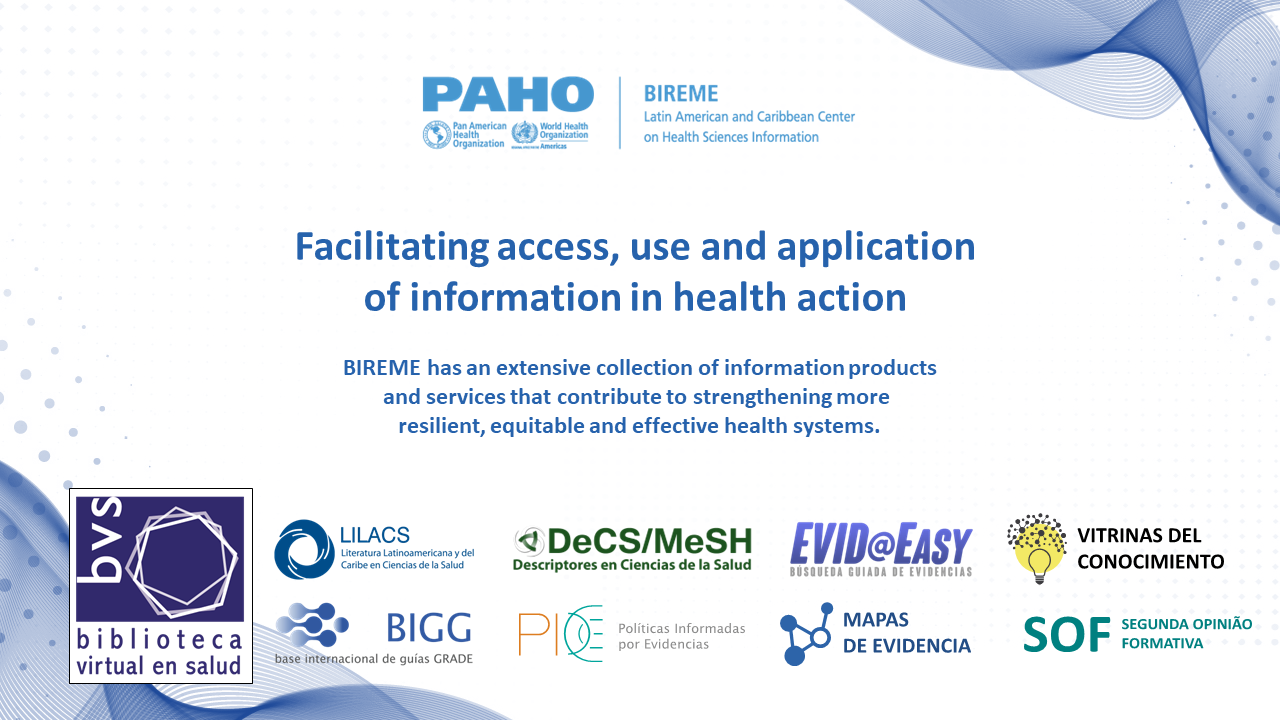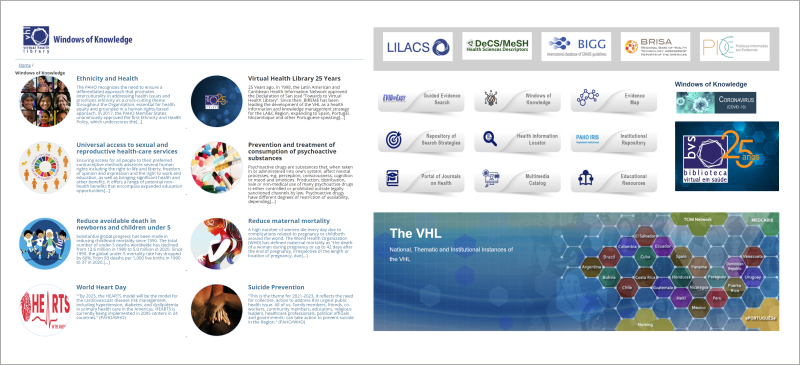The first semester of 2023, which corresponds to the second year of the biennium 2022-2023, was characterized by results achieved by BIREME/PAHO/WHO, both in terms of institutional strengthening and support to countries in the Region with information and evidence for health decision-making.
Its Biennial Work Plan 2022-2023 (PTB 22-23) continues to consist of over 50 projects/products and information services grouped into four initiatives: (1) Information and Knowledge Management; (2) Information Services; (3) Information Intelligence in Health Sciences; and (4) BIREME Leadership and Management.
During this semester, BIREME conducted a self-assessment of the PTB 22-23’s implementation level, with the main outcomes within the context of its management and operation, as well as the implementation of its technical cooperation program, to report to the Organization’s executive management in coordination with the relevant entities. Check out the highlights of the semester, which include:

Management and Operation
Strengthening of BIREME’s operations and technical cooperation products and services through the following agreements, accords, and actions subsidized by financial resources:
- Definition and discussion of the 2023-2025 BIREME Strategy aligned with the 4.0 industry and digital health;
- Effective exchanges for the formalization of the Headquarters Agreement in Brazil;
- Organization of the 2023 Governance Committee Sessions: the 11th and 12th Advisory Committee (AC) and the 9th Scientific Committee (SC) (include link to the subjects in the Bulletin, either here or at the end of the text/article);
- Project development with the Central Office for activities at the 1st WHO Global Summit on Traditional Medicine;
- Development of products and services within the context of TA4/TC93 for the Indigenous Health Virtual Library; and
- Continuation of Cooperation Agreement 93 (CA93), for the enhancement of BIREME, until February 2027; and
- Developments within the context of CA95, in coordination with PAHO Brazil, for the information management priorities of the Executive Secretariat (via General Coordination of Documentation and Information of the Undersecretariat for Administrative Affairs, CGDI/SAA) of the Ministry of Health of Brazil, with an extended validity until August 2025.
Effective management of BIREME’s operations through internal and external communication actions, IT infrastructure (datacenter change), service operation, servers, ICT platforms, and regular actions to develop skills and strengthen the organizational environment.

Technical Cooperation
- The regional BVS portal, marking its 25th anniversary in 2023, remains in regular operation, providing access to 58 sources of information totalling around 36.5 million records. Access numbers to the Portal in the first semester of 2023 surpassed 11.8 million access sessions from 8 million users, with 27 million page views.
- LILACS updated as the main index for scientific and technical production in Latin America and the Caribbean. The LILACS Network contributed with over 14.5 thousand new records, and LILACS reached 1.04 million document records, of which 61% have full-text links.
- The 2023 version of DeCS/MeSH was published, highlighting the continuation of the revision of the Homeopathy category and the start of descriptor revision in the Nursing field. In the first 6 months of 2023, there were 9,232,633 visits to the DeCS/MeSH portal pages by 1,784,975 users distributed across 208 countries.
- The DeCS/MeSH Finder service was used by 31,105 users from 92 countries, searching its texts more than 462,337 times, and the top 10 countries using it were Brazil, Spain, Colombia, Mexico, Peru, Portugal, Argentina, Ecuador, Chile, Cuba, and the United States.
- In 2023, meetings to strengthen and expand Network work focused on indexing processes according to the LILACS methodology. Three sessions were held in the first semester with an average of 100 participants/session from 15 countries.
- The user support service answered over 640 questions through the Ask the Librarian service (Livezilla). 109 new search strategies were developed, the search repository (RefNet) was updated with 52 new searches, reaching a total of 924 registered searches.
- Global-level partnerships and actions, mainly through projects coordinated with the WHO Library and Digital Information Networks Unit: (i) “COVID-19 – Global Literature on Coronavirus Disease” database with over 876,000 documents accessed by more than 5,364,000 users; (ii) Global Index Medicus (GIM) integrating Index Medicus coordinated by WHO Regional Offices with over 2.386 million bibliographic references in health accessed by more than 791,000 users; (iii) operation of the AFRO/WHO Index Medicus on the BVS technological platform; (iv) support for using the ProEthos platform, developed by BIREME in coordination with the OPS Regional Bioethics/HSS team, to systematize the work processes of Ethics Committees in Research involving Human Beings;
- Maintenance of e-BlueInfo version 2.0, with document collections and features like the option to store favorite and visited documents (through authentication). Brazil, Peru, Guatemala, El Salvador, Paraguay, and Colombia are part of the e-BlueInfo network with over 18,600 application downloads.
- BIREME with KT/EIH continued updating EVID@Easy with improved guided searches, generation of new filters, and updating of 27 tracks.
- Three new evidence maps were developed and published in the VHL in 2023 (Chikungunya, Anthroposophical Medicine, Health Promotion and Excess Weight), along with the monitoring of 5 working groups for map development: Arboviruses, Chagas Disease, Teleodontology, CovidEnd, Medicinal Cannabis. The Evidence Map Portal was updated and has 44 registered maps.
- Four new Knowledge Windows were developed and published in the VHL in 2023: 25 Years of VHL; Sanitary Emergency in the Yanomami Territory (in Portuguese); SDG3 goal 3.5 – Prevention and treatment of psychoactive substance use; and SDG3 goal 3.7 – Universal access to sexual and reproductive health services. The Knowledge Windows Portal in the VHL was updated and has 61 registered windows, including the Monekypox Window.
The highlighted results were made possible through the effective coordination of the Center with the various actors cooperating with the VHL Network and its regionally coordinated information sources by BIREME, a specialized center of PAHO/WHO, which also comprises its Evidence and Intelligence for Health Action Department (EIH). Additionally, the commitment and dedication of the entire Center’s team were essential.